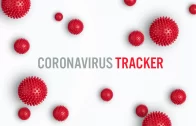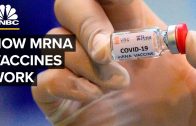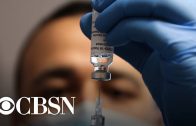Merck’s COVID Pill Potential Risks
Why a pill you take at home could change the direction of the pandemic
Existing COVID-19 therapies are administered through infusion in a clinical setting

Give your feedback below or email audiofeedback@marketwatch.com.
Merck and Ridgeback Biotherapeutics’ promising oral antiviral could shift the direction of the pandemic by making it easier for people with COVID-19 to take a pill at home that can keep them from getting severely sick.
Merck’s MRK, -0.86% stock gained 9.1% in trading on Friday after announcing that the drug, molnupiravir, cut the risk of hospitalization or death by 50% in a Phase 3 clinical trial. (Ridgeback is privately held.)
The drug, which inhibits replication of the virus, was tested in 775 “at-risk” adults with mild or moderate cases of COVID-19. No one taking the drug died in the trial; eight deaths were reported among those taking the placebo.
It also appeared to work against the gamma, delta, and mu variants in the roughly 40% of participants for whom sequencing was available.
“It’s a very big deal,” Dr. Eric Topol, director of the Scripps Research Translational Institute, said in an email. “If safe and inexpensive (even freely available) as a pill that is easily taken, it could have enormous benefit for reducing severe illness, for both unvaccinated and breakthrough vaccinated people.”
Topol on Twitter has already referred to molnupiravir as the “M-pack,” a play on the commonly prescribed Z-Pack antibiotics.
The U.S. has already ordered 1.7 million treatment courses of molnupiravir at a price of about $705 for each five-day course of treatment.
That said, there are still a few caveats. The companies have so far only shared clinical data in a news release and not in a preprint or medical study. It’s also unclear if any of the participants in the trial were vaccinated and if so, how many. (Topol noted that knowing this won’t “detract from its potential importance.”)
The case for new COVID-19 treatments
The COVID-19 vaccines are by far the best therapeutic tool in our pandemic arsenal. Not only are they very effective at preventing people from ending up in the hospital or dying, they for the most part keep people from getting even mild cases of COVID-19, though these breakthrough infections are on the rise.
There are a handful of therapies that can help COVID-19 patients who are at high risk of developing severe cases or are already in the hospital, but all of them are administered by infusion in a healthcare setting.
These include the monoclonal antibodies developed by Eli Lilly & Co. LLY, +0.70%, Regeneron Pharmaceuticals Inc. REGN, -0.43%, and Vir Biotechnology Inc. VIR, -2.83% and GlaxoSmithKline GSK, +0.60%. Other therapies, like Gilead Sciences Inc.’s GILD, -1.42% Veklury and the steroid dexamethasone, which has been repurposed as a COVID-19 drug, are reserved for critically ill hospitalized patients.
When it comes to treatments for mild to moderate cases of COVID-19 among the general public, we have been out of luck. There are no Tamiflu-like pills that patients can take at home.
“The availability of an effective oral drug that can be given in the outpatient setting can blunt the risks associated with breakthrough infections and reduce mortality in the unvaccinated, which can begin to move the nation out of the pandemic and hasten reopening,” RBC Capital Markets analyst Brian Abrahams told investors on Friday.
If and when authorization or approval of molnupiravir and other investigational antivirals takes place, it will likely shift the course of the pandemic and bring us one step closer to making the virus something we can live with and less of something to be feared.
“The fact that this is moving from a pandemic probably to being more endemic, there’s a real need for an antiviral,” Merck CEO Robert Davis said Sept. 13 at the Morgan Stanley Global Healthcare Conference, according to a FactSet transcript of the presentation.
Other COVID-19 antivirals in development
There are half a dozen oral antiviral drugs in development right now, spurred by a $3 billion investment from the National Institutes of Health into COVID-19 antiviral development back in June.
Pfizer Inc. PFE, -1.35%, already a pandemic favorite for its role developing Comirnaty, the first authorized and approved COVID-19 vaccine in the U.S., is expected to have late-stage clinical data for its investigational antiviral pill before the end of the year.
“We think an oral is a critical piece of the solution to the pandemic,” Pfizer Chief Financial Officer Frank D’Amelio said Sept. 14 at a Morgan Stanley conference. “It could be prescribed for a 5-day treatment course at the first sign of infection before patients are hospitalized for critical care.”
Both Pfizer and Merck are also testing their antivirals for post-exposure prophylaxis to COVID-19. In these instances, if someone is exposed to another person who has tested positive for the virus, they can take medication preventively to ward off a COVID-19 infection.
Several other small drug makers and biotechs are also testing antivirals as COVID-19 treatments, including Adamis Pharmaceuticals Corp. ADMP, , Atea Pharmaceuticals Inc. AVIR, -1.78%, and RedHill Biopharma Ltd. RDHL, -2.16%. Gilead has also been studying Veklury as a treatment for high-risk COVID-19 patients who have not been hospitalized.
Merck said Friday it plans to soon submit the data for emergency authorization.
Merck’s stock is down 3.7% for the year, while the broader S&P 500 SPX, -0.51% is up 14.7%.
BioNTech CEO reportedly says a different COVID vaccine may be needed by next year

This screen capture taken from a video livestream by German biotechnology company BioNTech shows Uğur Şahin speaking during a December 2020 press conference on COVID-19 vaccine development.
BioNTech/Agence France-Presse/Getty Images
Give your feedback below or email audiofeedback@marketwatch.com.
BioNTech’s chief executive officer, Uğur Şahin, has reportedly told the Financial Times in an interview that COVID-19 is likely to continue mutating to the point where it can evade vaccines and immune systems.
A COVID vaccine developed by BioNTech BNTX, -4.66% and Pfizer PFE, -1.35%, using mRNA technology, has been used worldwide to help fight the pandemic, with 1.5 billion doses shipped to more than 130 countries as of late September, according to a company presentation. Vaccines and booster shots currently available are potent enough for the current strains, including the highly contagious delta, but the virus has just started a process of evolving, said Şahin, according to an interview with the FT published Sunday.
“We have no reason to assume that the next generation virus will be easier to handle for the immune system than the existing generation,” said Şahin, who sees the coming year’s focus on booster shots for the vaccinated and a continued effort to vaccinate those who haven’t been, according to the FT.
Last week, financial markets cheered news of Merck MRK, -0.86% and Ridgeback Therapeutics’ experimental oral antiviral treatment for COVID-19. The drug, molnupiravir, cut the risk of hospitalization or death by 50% in a Phase 3 trial, and seems to work against the gamma, delta and mu variants in around 40% of participants for whom sequencing was available.
Read: Why a pill you take at home could change the direction of the pandemic
Medical experts have warned, though, that Merck’s potentially groundbreaking new treatment could be used by some as an excuse not to get vaccinated. “It’s not a magic pill,” said Dr. William Schaffner, a professor in the infectious-diseases division at Vanderbilt University Medical Center.
Read: Fauci says legitimate claims to religious exemptions from vaccine mandates are scarce















